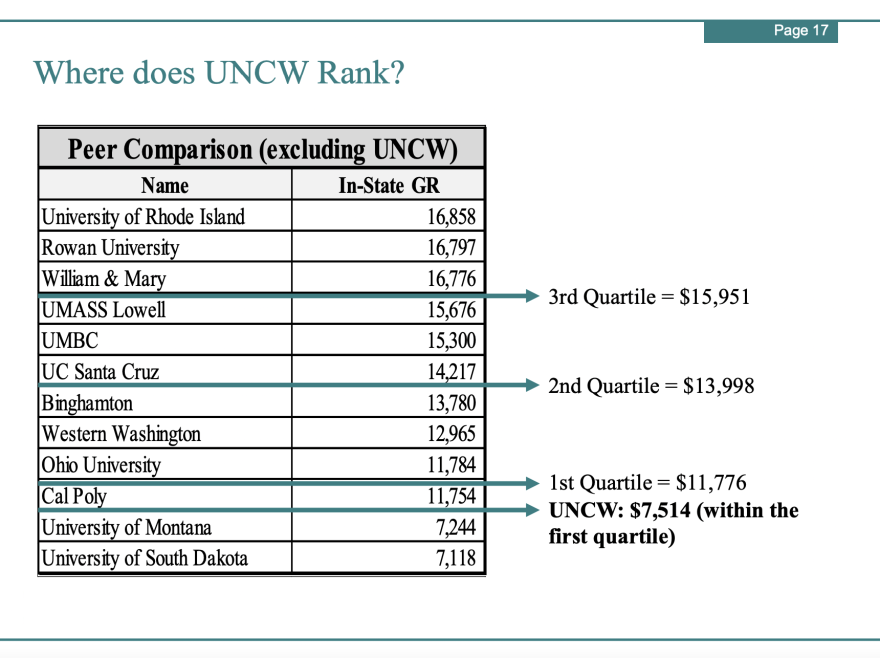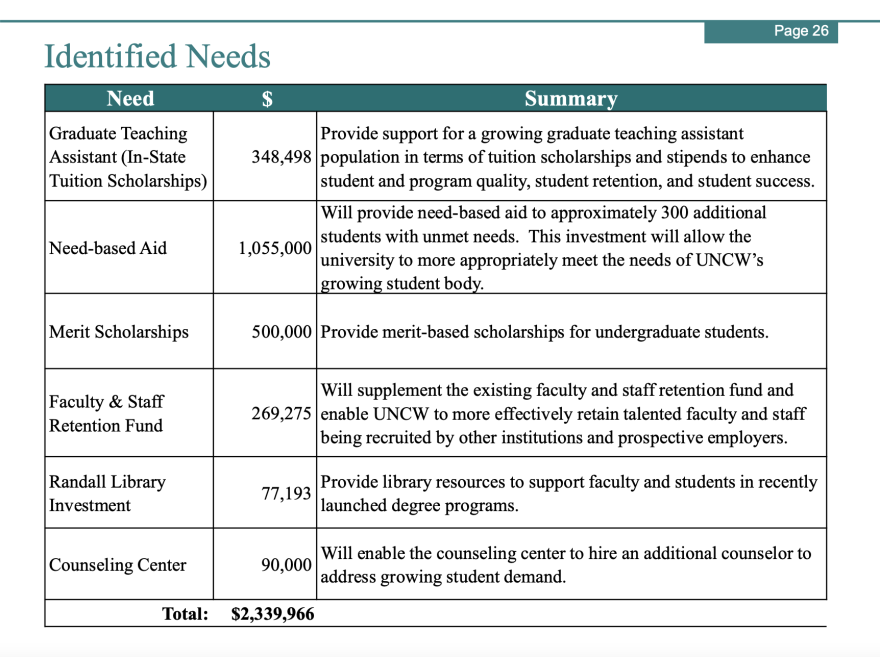How does UNCW compare to other state institutions?
Comparing current tuition costs for resident graduate students and non-resident undergraduate and graduate students, UNCW is less expensive, university officials argue.
According to Lackey, “the Board of Governors establishes a peer group of institutions for each UNC System campus to be used for benchmarking and comparison purposes.”
For example, William & Mary costs $47,196 a year for undergraduate non-resident students (the most expensive from the comparison list), while UNCW currently costs $21,243 for the same students.

This also goes for graduate resident students. When it comes to graduate non-resident students, UNCW is a bit more expensive than other schools, but still in the bottom half in terms of cost with William & Mary still in the lead.

Who is going to see the increase, and why?
The 5.5% tuition and fees increase that was passed is going to be shouldered mostly by non-resident undergraduate students, but will still affect all graduate students as well. Undergraduate resident students will see no change in their costs.
Student body representatives at UNCW expressed concern about making non-resident students shoulder most of the cost, and voted against supporting the tuition and fee increase when it was put to a vote.
Lackey and other board members brought up the meaning of a “state school” to rationalize non-resident students paying more. The UNC system receives considerable support from North Carolina tax dollars. Officials argue that in many cases resident students' families have been paying state taxes (for at least as long as it takes to establish residency), and are therefore doing their part in contributing to the school’s overall funding, justifying lower tuition and fee costs. Non-resident students, even if they are paying sales and income tax, don't have the same track record of paying taxes — or so the argument goes.
At the meeting, some of the board members asked Hannah-Valentina Horowitz, president of the Student Government Association at UNCW, why some student body representatives voted against supporting tuition increases despite the detailed financial analysis used to support it.
“So you're saying, just that headline is enough to scare them off that maybe a little more research would have been a different scenario," asked member Gidget Kidd.
Member H. Carlton Fisher asked, "the 18 [SGA members that] opposed it, do you think were not well schooled?"
"Yes," was Horowitz's answer.
WHQR reached out to Horowitz for comment on her reaction to this exchange. She said every year, comprehensive forums are held for any UNCW student to attend:
“Students have every opportunity to educate themselves on CITI [campus-initiated tuition increases] and the process. However, students often don’t attend these forums and only get concerned when they hear about a tuition increase — they don’t necessarily know what causes the increases — despite the fact that we give them the opportunity to understand them,” she said in a written statement.
The vote was close, according to Horowitz, because some student senate members themselves did not understand the process and why tuition increases were necessary.
The school, including Horowitz, did everything they could, to educate the students, she said.
The school has been fighting to keep up with inflation, and the funding needs were described as “significant.” University staff at the Business Affairs Department tested three models, with increases at 5%, 5.5%, and 6%. Those would bring in $2.1 million, $2.3 million, and $2.5 million, respectively in additional revenue to the university. Ultimately, the 5.5% model was chosen. With this decision, university officials said they remained “sensitive” to the student’s personal financial situations.

What specifically needs funding help?
Most of the funds are needed to help support salaries, scholarships, and financial aid to students. Graduate teaching assistants are being offered additional in-state tuition scholarships to help grow the number of TA’s while being able to offer them living salaries. The hope is for more students becoming TA’s with the new wages. Additionally, stipends and scholarships will facilitate higher program quality and student retention.
The biggest chunk of additional revenue from the tuition and fee increase is going to support need-based aid. UNCW will be able to support approximately 300 additional students with unmet needs, according to the presentation.
Merit-based scholarships for undergraduate students can be expanded with the extra revenue.
The counseling center would also be able to hire an additional counselor to help meet the needs of the growing student body population at UNCW.

What are “fees” outside of tuition?
There are two different types of fees. Quality of life fees refers to a specific area in which money will be spent outside of the academic sphere, such as an organization or service on campus. Student fees go to things like campus life enhancement which falls under the Student Union, athletics, or the student health center services offered.
Program fees and course fees are fees that specifically go into funding specific academic classes and programs such as the proposed MA in Integrated Marketing Communications program which is an existing UNCW program. A new program, the BS in Intelligent Systems Engineering will also benefit from these new course fees included in the 5.5% increase.
Housing and food is another aspect that falls under the fee category. All of the room types in all of the campus-owned housing options (including those off campus) are seeing an increase of 4% in cost. The actual dollar amount varies on the building and room type, such as single or double occupancy.
The three meal plans are all seeing a 6% increase in cost for all students. They still have the option of which type they’d like to choose.
The overall final breakdown of the total cost of living at UNCW can be found here.
Disclosure: UNCW provides underwriting for WHQR.


